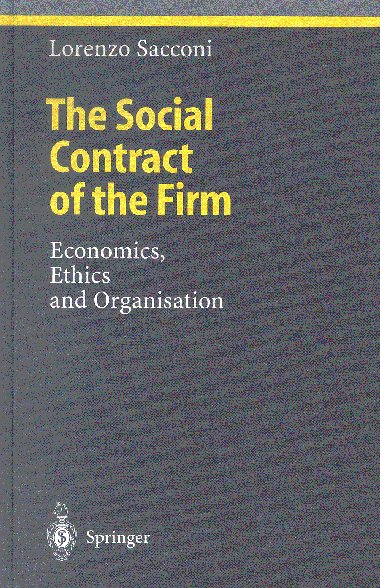| Chapter 5 - Information Incomplete Contracts and the Ethical Code | 115 |
| I. Default Rules and Contracts | 115 |
| II. Default Rules and Corporate Ethical Code | 118 |
| III. Complete and Incomplete Contracts and Information | 120 |
| IV. The Logic of Incomplete Knowledge and Limited Reasoning | 124 |
| V. Explicit Contracts Implicit Rules and Ethical Code | 129 |
| VI. Vagueness VS. Precision | 132 |
| Chapter 6 - Dealing with Vagueness of Norms: the Theory of Fuzzy Sets | 135 |
| I. Introduction | 135 |
| II. Definition of Elementary Fuzzy Concepts | 138 |
| III. Fuzzy Sets and Possibility | 143 |
| IV. Unforeseen Contingencies and Vagueness | 146 |
| V. Moral Code and Vagueness | 151 |
| VI. Limitations of this Way of Dealing with Vagueness | 156 |
| Chapter 7 - A Game Theoretic Model of Incomplete Contract and Ethical Code | 161 |
| I. The Hierarchical Transaction as a Game | 161 |
| - 1.1 A Hierarchical Transaction | 161 |
| - 1.2 The Game in Extended Form: the Moves of Player A | 162 |
| - 1.3 The Moves of Nature | 165 |
| - 1.4 The Moves of Player B | 166 |
| - 1.5 Payoffs in the Case of Foreseeable States | 167 |
| II. The Game in the Presence of Unforeseen Events and Vague Knowledge | 170 |
| III. Incomplete Contract and Ethical Code | 173 |
| IV. 'Mute' Contractual Rules VS. 'Vague' Moral Principles | 178 |
| Chapter 8 - Ethical Decision-making Procedure: Vagueness Default Reasoning and Reputation | 185 |
| I. Vagueness and Application of the Constitutional Principle (the First Step in the Ethical Procedure) | 185 |
| II. The Second Step in the Ethical Procedure: Fuzzy Measures of Surplus and Effort | 190 |
| III. Vagueness of Efficient/Fair Outcomes: the Third Step in the Ethical Procedure | 193 |
| IV. Default Deduction of Admissible Actions (the Fourth Step in the Ethical Procedure) | 197 |
| V. Back to Reputation Effects | 202 |
| VI. Reputation in Unforeseen States of the World | 207 |
| VII. Limitations and Final Remarks | 212 |
| References | 215 |
| Names Index | 227 |


